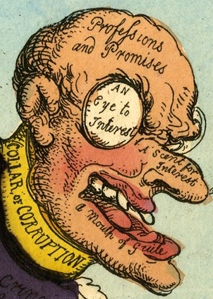All 1 entries tagged Trials;
No other Warwick Blogs use the tag Trials; on entries | View entries tagged Trials; at Technorati | There are no images tagged Trials; on this blog
October 01, 2021
Corruption and State Trials
In a chapter just published I examine prosecutions for corruption in the seventeenth and eighteenth centuries. As well as prosecuting political and religious dissent, later Stuart state trials also targeted corrupt ministers who had been the subject of parliamentary investigations and were subsequently impeached for ‘high crimes and misdemeanours’. Indeed, as Lord Mansfield observed when passing judgement on a corruption case in 1770 and reflecting back on the previous two hundred years, ‘there hardly ever is an impeachment against a minister where the charge is not for receiving money for procuring a grant from the king’. The process of impeachment had been revived in 1621 specifically to deal with corruption allegations against Lord Chancellor Bacon and the device was frequently used over the next fifteen years. It once again became a potent weapon during the Restoration and was repeatedly used until 1725 when a Lord Chancellor was again tried in parliament for corruption.

The chapter investigates these trials in order to show how frequently issues of financial corruption were part of impeachments in the period after the Glorious Revolution and to reflect in turn on what these trials tell us about the nature of corruption more generally in this period. The chapter also analyses the defence arguments employed by the accused, highlighting how appeals to custom and to the letter of the law, as well as attempts to redefine bribes as ‘gifts’ or ‘presents’, were deployed both as a reflection of blurred conceptual boundaries and as a way of neutralising allegations of corruption. Misbehaviour was represented in such defences in terms of norms of friendship, the personal nature of office-holding or cultural factors, and these arguments were symptomatic of those deployed in many other attempts to grapple with early modern corruption. The cases therefore illustrate the difficulties involved in prosecuting this most slippery of crimes, as well as the extent to which its definition was problematic and contested. The chapter also demonstrates that state trials were, by their nature, very frequently politicised, and hence that they were a very blunt way to tackle corruption. For these reasons, impeachments fell into disuse after 1725 until a brief revival once more in the later eighteenth century and early nineteenth century, after which they were permanently abandoned.
Details about the volume can be found here
 Mark Knights
Mark Knights

 Please wait - comments are loading
Please wait - comments are loading

 Loading…
Loading…

